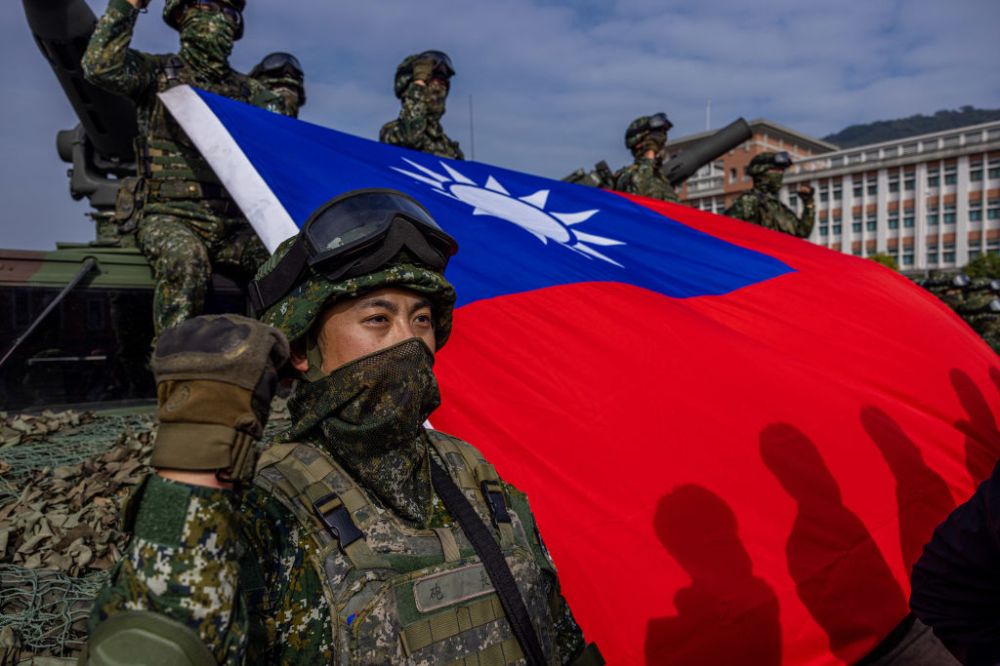How far are the United States and its allies willing to go to deter China from attacking Taiwan and sparking war?
U.S. lawmakers and security experts are raising the specter of serious sanctions against China if it tries to seize the self-governing, democratic island of 23 million people. But economic reprisals would take significant preparation and coordination to pull off, and time may be limited. War with China over Taiwan could come in the next two years, a U.S. general and a top Republican lawmaker have said in recent days.
Rep. Michael McCaul, chair of the House Foreign Affairs Committee, said Sunday on Fox News that the odds of conflict with China over Taiwan are “very high.” He believes Gen. Mike Minihan, head of the U.S. Air Mobility Command, was correct in writing in a new memo that war over Taiwan will happen in 2025—sooner than other estimates.
McCaul’s comments underscore how alarm is growing on Capitol Hill.
Lawmakers advanced policies last year to rebuild weapons supply chains and replenish U.S. stockpiles depleted by helping Ukraine. Members also approved language in a year-end spending bill and a defense authorization measure to boost weapons sales to Taiwan and provide loans to assist the island’s defense—though it’s still unclear if the U.S. would launch its own military response to help Taiwan if attacked.
More lawmakers are thinking beyond weapons and military posturing, asking how the United States can impose economic consequences for China’s potential aggression. But that could be a tall order.
Sanctioning China would be “an exponentially more difficult task” than sanctioning Russia since its invasion of Ukraine last year, Sen. Marco Rubio told The Dispatch in an interview last week.
“What’s made the Russia sanctions so effective is the willingness of the European Union and others around the world to go along,” said Rubio, a Florida Republican and longtime critic of the Chinese government. “The dependency on China of many countries, both as a market for their own companies and as a source of import, gives them a lot more leverage than the Russians had in global affairs in terms of influencing who’s willing to go along with sanctions and who isn’t.”
Whether U.S. allies would quickly rally against China after a move against Taiwan, as they did with Russia, is unclear.
China’s “price of military action against Taiwan needs to be higher than the benefit” in order to deter an invasion, Rubio said. “And it’s not just the military price. It’s the economic price, their partnerships and reputation around the world. So I think there has to be comprehensive thought to how to make something like that happen.”
Work on this front gained momentum last year in Congress. Senate Foreign Relations Committee Chairman Sen. Bob Menendez’s Taiwan Policy Act initially included language requiring sanctions if China moves against Taiwan, but that was ultimately stripped out of the bill amid jurisdictional concerns from other committees. A group of Senate Republicans led by Florida Sen. Rick Scott also introduced a measure last year requiring sweeping sanctions on Chinese officials and firms in the event of an attack. So did Alaska Republican Sen. Dan Sullivan, alongside GOP Rep. Mike Gallagher, the chair of the House’s new select committee on competition with the Chinese Communist Party.
Those efforts could make a comeback this year. Gallagher has further argued war games related to Taiwan should incorporate the Treasury and Commerce departments, and he plans to hold a field hearing with financial actors in New York to discuss the economic implications of a confrontation over Taiwan.
The Biden administration has reportedly done some early work to identify sanctions options, and Taiwanese diplomats last year urged European leaders to begin thinking about how they would respond to an attack. But is more urgency needed?
Congress and the White House are having “constant” discussions over various reprisals for hostility toward Taiwan , “most of which are classified,” Sen. Jim Risch, the top Republican on the Foreign Relations Committee, told The Dispatch. “This is not something that is just sitting on the shelf,” he said last week. “It is actively discussed.”
The U.S.-China Economic and Security Review Commission—an independent agency tasked with following America’s trade relationship with China and its security implications—has argued such discussions should be more formal. The panel’s 2022 recommendations for Congress included advancing a bill to create a permanent interagency committee in the executive branch “charged with developing options and creating plans for the imposition of sanctions or other economic measures” across a range of potential scenarios, such as an outright attack on Taiwan or a blockade of the island.
Two experts at the Center for Strategic and International Studies, Jude Blanchette and Gerard DiPippo, recently argued that if China moves against Taiwan, the economic consequences (for China and the rest of the world) would be enormous.
Demonstrating to Beijing that America is building a coalition to punish aggression would be a powerful deterrent for now, Blanchette recently said on the “China Talk” podcast. Chinese leaders should understand Taiwan would come only “at the cost of being part of the global economy.”
Advanced nations have the resources to recover from such a catastrophe, DiPippo said on the same podcast, even if it means spending a “fortune” to move supply chains out of China.
“The United States and the G7 were rich well before China was integrated into the world economy,” he said. “There is a world—a darker world—in which China is basically excluded from that path to development, but the G7 just kind of chugs along after a period of recovery.”
On the Floor
Republicans will introduce several pandemic-related bills in the House this week: One to end the national emergency then-President Donald Trump declared in March 2020, and another to require federal agencies to return to pre-pandemic levels of remote work.
The second bill leaves open the possibility of expanding remote work, if agency heads certify plans would have substantial positive effects on a given agency’s performance, better disperse agency personnel throughout the country, substantially lower the agency’s costs (in building maintenance or rent, for example), and ensure telework employees will have secure network capacity and tools for their work. The legislation also requires all agency heads to submit a report to Congress laying out how expanding telework at the start of the coronavirus pandemic impacted their agency’s mission and performance.
The House will also consider a resolution this week condemning socialism. A full list of bills the House may vote on this week is available here.
The Senate is considering executive nominations, with the possibility of an organizing measure to get committees off the ground later this week.
Key Hearings
- The House Judiciary Committee will hold a hearing Wednesday morning on President Joe Biden’s handling of the southern border. Information and livestream here.
- Members of the House Oversight and Accountability Committee are scheduled to examine federal pandemic spending and waste, fraud, and abuse in a hearing Wednesday morning. Information and livestream here.
- The House Transportation and Infrastructure Committee will hold a hearing Wednesday morning on supply chain challenges. Information and livestream here.






Please note that we at The Dispatch hold ourselves, our work, and our commenters to a higher standard than other places on the internet. We welcome comments that foster genuine debate or discussion—including comments critical of us or our work—but responses that include ad hominem attacks on fellow Dispatch members or are intended to stoke fear and anger may be moderated.
With your membership, you only have the ability to comment on The Morning Dispatch articles. Consider upgrading to join the conversation everywhere.